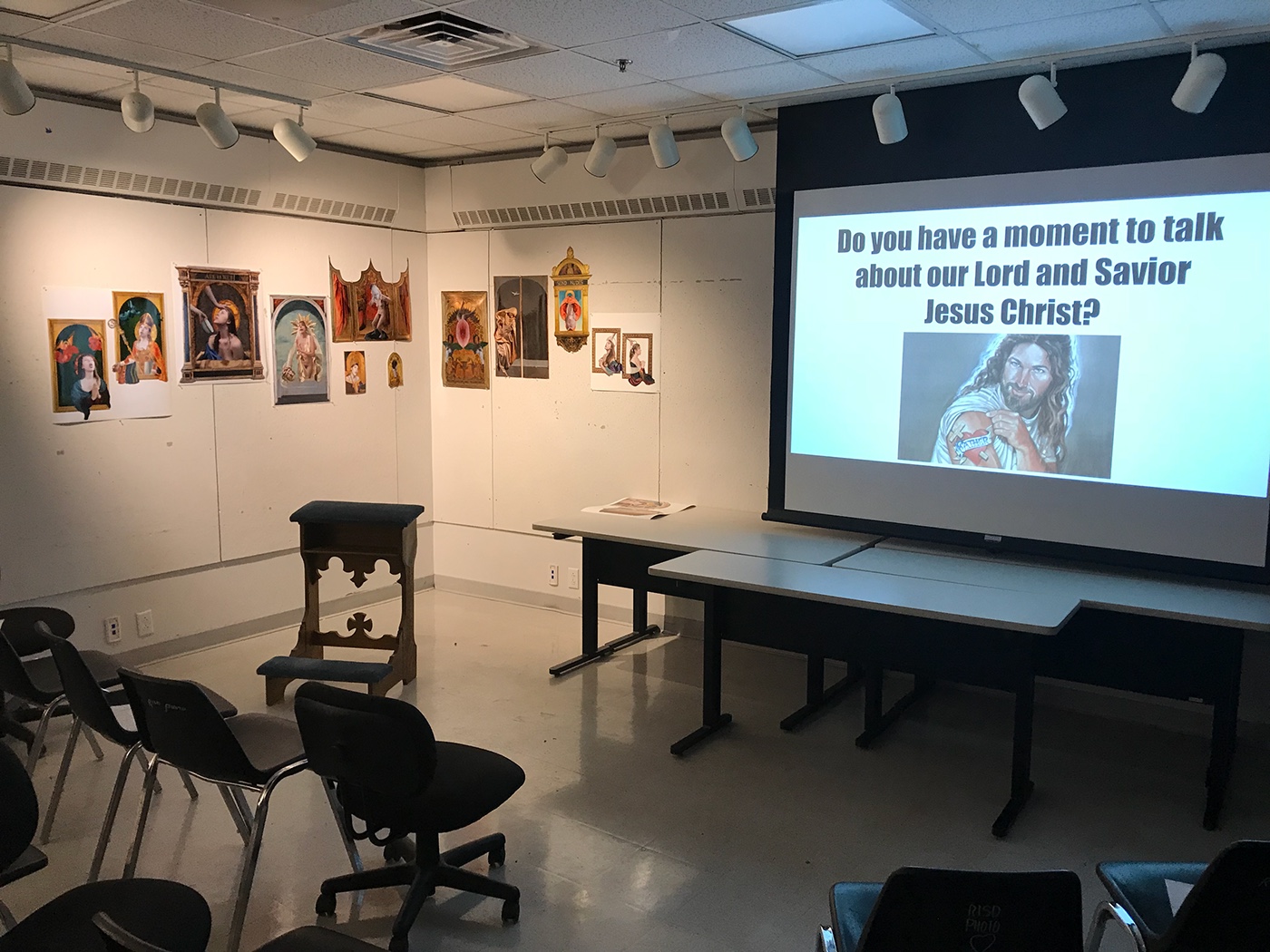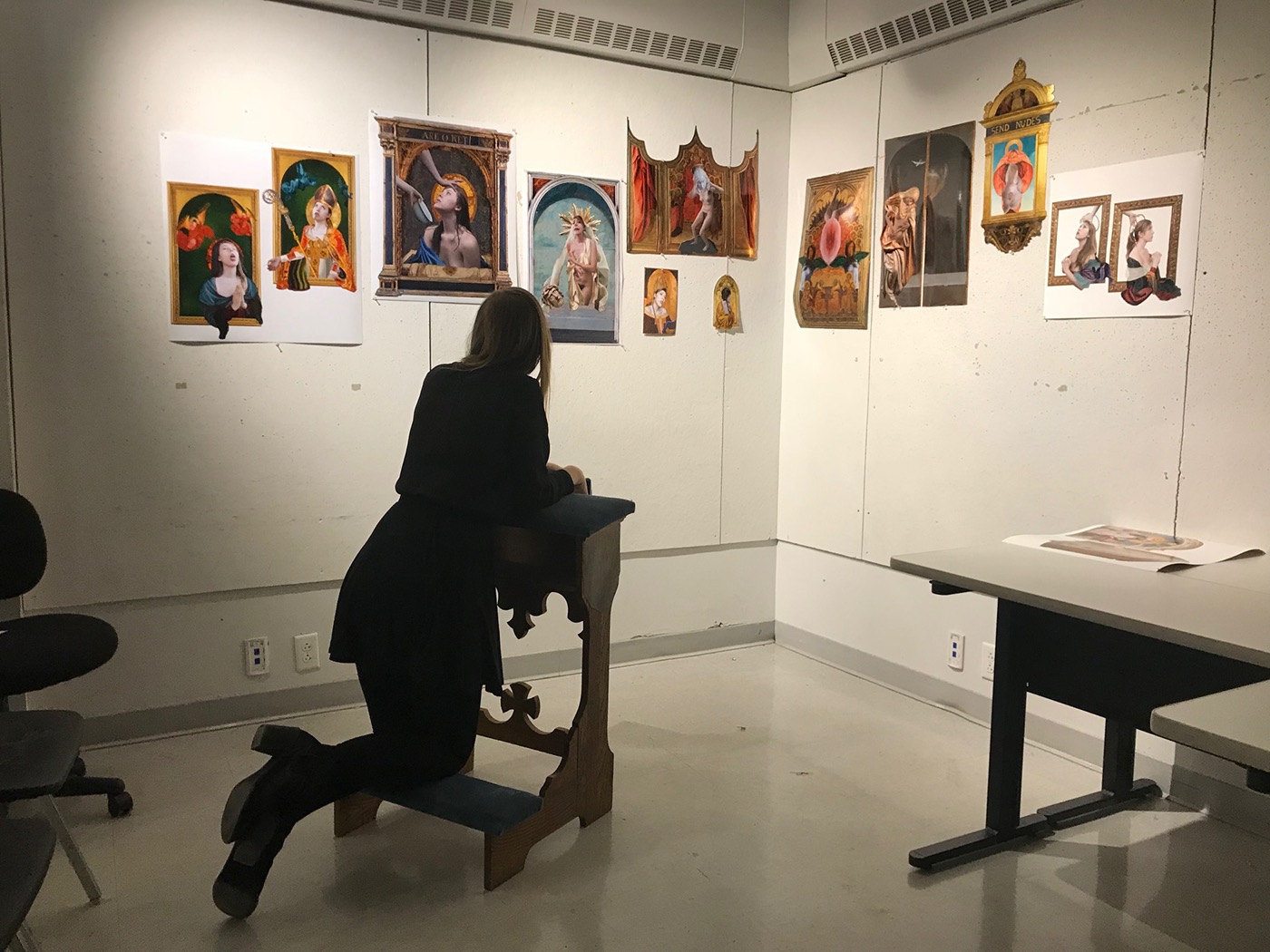


I think doubt and humor are really important spiritual experiences for me. Humor and satire as a place for processing and for healing. Not necessarily making light of things I struggle with but reframing them in a way that makes them human, because when we laugh at things that seem insurmountable they become malleable. Doubt as a parallel to faith. Irrevocably tied and inseparable from one another. Leslie Haselton (who writes biographies of biblical figures) says: “Abolish all doubt, and what's left is not faith, but absolute, heartless conviction... you find the perfect antidote to thought and the ideal refuge of the hard demands of real faith” I think of Jacob who wrestles with an angel and wins or Jesus who can be tempted.
I am a montage artist for a lot of different reasons. Broadly, its because I suck as a photographer. Which is sort of awkward to admit after three years of paying to get an education. I’ve never shot a satisfying photograph, at least satisfying to me. I can make a satisfying image. I feel also though, that it’s a sort of natural medium for the subject matter. I’m interested in how things roll forward in time, how sacred ideas change, how methods of advertisement adapt, how as something as stagnantly unshakable as faith evolves. How do I look at Jesus? How does the vast amount of history that accumulates into my existence frame the way I can look at Jesus? How do I change how my grandchildren will look at Jesus? The gathering of the historical imagery I collage on and around myself is just as much apart of the thought process as the handheld digital exploration I perform when I take a self portrait. I enjoy the sort of violence of the medium when I splice up pieces of historical relevance rearranging and positioning them onto my body in ways that contextualize and make sense to me making a sort of Frankenstein iconography.
I’m in part, a self portrait artist. I’m interested in the dynamic that happens when im both the viewer and the viewed. this runs parallel to my interest in being both the comedian and the butt of the joke. What does it mean to be a woman within the realm of crude humor is so often masculinized? What does it mean to position myself as sacred and then to be profane? Do these exist as separate realms of experience or are they two sides of the same coin? Can one exist without the other? Does god have a sense of humor?
I think a lot about medieval monks who painstakingly copied the bible leaving notes in the margins that were often visual puns to the passages, sexual and explicit in nature. Michael Camille, art historian, writes on the subject “We should not see medieval culture exclusively in terms of binary opposites sacred/ profane for example or spiritually / worldly for these margins suggest to us that people enjoyed ambiguity. Travesty, profanation, and sacrilege are essential to the continuity of sacred society.” I wonder if I can critique something I have some amount of stubborn reverence towards. I wonder if this reverence can exist after I critique. Am I doomed to only be one or the other, sinful or saintly; un questioning or heathen. Is there room for fluidity is there room for ambiguity?
How heavy is the ideal and burden of purity? Is it alright to question the morality of god? Can god change his mind? My mother used to emphasize the story in exodus 32 when the Israelites begin worshiping a golden calf in the desert. She emphasized it for a very different reason than the reason I became so interested in the story. And im paraphrasing this in efforts to not turn this presentation into a bible reading. In it god tells mosses that hes going to destroy every person who has turned from him to worship the idol but Moses argues. He asks what is the purpose of saving his people from Egypt is if he is just going to smite them in the desert. God changes his mind, his anger calms, he doesn’t smite anyone. Moses goes down to the people and sees them worshiping the calf and enraged he has 3000 people killed. If we criticize vengeance are we doomed to become vengeful?
How much can I pussyfoot around disagreeing with the bible, maybe by extension disagreeing with god’s morality? particularly on the subject of women. Timothy 2:11 “11 A woman[a] should learn in quietness and full submission. 12 I do not permit a woman to teach or to assume authority over a man;[b] she must be quiet. 13 For Adam was formed first, then Eve. 14 And Adam was not the one deceived; it was the woman who was deceived and became a sinner. 15 But women[c] will be saved through childbearing—if they continue in faith, love and holiness with propriety.” Can I even give this presentation? Are these words eternal, fixed or can the bible be reinterpreted and changed. How do we remarket and rebrand ideals for my generation? How do harmful ideas fall forward how do new ideas reinterpret old text? Can god see what I google? Is it fornication if I send a nude?
Is it alright to ask questions with no discernable concrete answer? What is a better place for this than in art? This semester I read “Christ’s sexuality in renaissance art and modern oblivion” there’s this wonderful quote that goes “We have to consider that Renaissance artists, committed for the first time since the birth of Christianity to the naturalistic modes of representation were the group within christendom whose field of work required them to plot. Every. Inch. Of christs body. They asked intimate questions that do not translate well into words, at least not without disrespect: wheather for instance Christ clipped his nails short or let them grow past his fingertips.” And I really latched on and loved the idea of this. The idea that within visual imagery we can and are almost forced to ask questions that would otherwise sound ridiculous. That would other wise sound disrespectful, salacious, wanton. I think a lot about those rennissance artists, how they made decisions in their representations of the image of god. Where did they draw their conclusions from? Self portraiture, historical tradition, divine inspiration? Is god in the hand of the artist or does the hand of the artist create god? I think about their fascination in depicting the space where the divine meets humanity. Their fascination with sin, sacrifice, motherhood, childhood, the theatricality of life and death.
And above all else I think about their fascination with christ’s penis.

